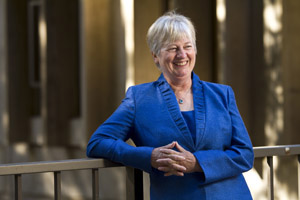Campus News
Alison Galloway addresses budget challenges at web-streamed forum
While expressing gratitude and relief about the passage of Proposition 30, Campus Provost/Executive Vice Chancellor Alison Galloway spoke of the significant budget challenges the campus still faces during a web-streamed forum with the campus community last week.

Alison Galloway, UCSC professor of anthropology and EVC-designate
While expressing gratitude and relief about the passage of Proposition 30, Campus Provost/Executive Vice Chancellor Alison Galloway spoke of the significant budget challenges the campus still faces during a web-streamed forum with the campus community on November 14
Galloway, in a webcast, which also featured Fiona Weigant of the UCSC Staff Advisory Board and UCSC Academic Senate chair Joe Konopelski, said the initiative’s passage prevented a massive “trigger” cut of $375 million to the UC system.
Those cuts would have followed four years of huge cuts to the UC system, which resulted in a $59 million reduction in state support to UCSC.
“Thanks to the voters of California for helping to support the university system,” Galloway said. “We feel extremely grateful. The big question is, what will happen now that Proposition 30 has passed?”
Galloway shared some good news: the passage of the initiative means that further trigger cuts are unlikely in the immediate future. But she cautioned that Proposition 30’s passage “doesn’t mean that everything is smooth sailing.”
Even with the initiative’s passage, UCSC must still make plans to permanently implement $12 million to $16 million in budget cuts for the current fiscal year. This reduction must be put in place by July 2013.
During the rest of her presentation, Galloway talked about the impacts of previous cuts to UCSC, and efforts to minimize impacts to academics and student experience.
Despite the university’s best attempts to minimize cuts to the academic areas, UCSC has seen an increase in the number of larger classes, with 16 percent of courses now having 100 students or more, compared to 12 percent in 2008-09.
Cutbacks have also resulted in personnel reductions, from 2,232 general-fund and tuition-supported faculty and staff positions in 2008 to 1,852 in 2011, a 17 percent decrease.
She also remarked about a troubling funding trend throughout the UC system. State support for UC peaked in the early 1990s and early 2000s. “It has just dropped precipitously since then” throughout the system while tuition steadily increased, Galloway said.
In an online Q&A with viewers, Galloway, Weigant, and Konopelski talked about potential ways to address budget reduction challenges.
The Academic Senate, for example, has been working with the administration to identify ‘gateway classes’ that students need to move through their majors and graduate in four years, Konopelski said.
All three panelists urged students, faculty, and staff to get the word out about the importance of a UC education and the need to preserve state funding.
“Talk to your neighbors,” Galloway urged. “You don’t have to go on a big campaign across the state. Just explain what is going on at the university and the fact that we are hitting this point where we could jeopardize the university’s [ability] to contribute to the future of the state.”